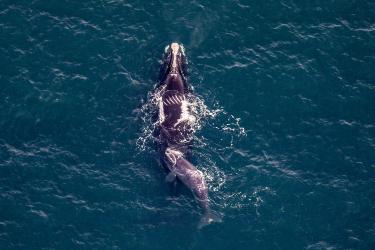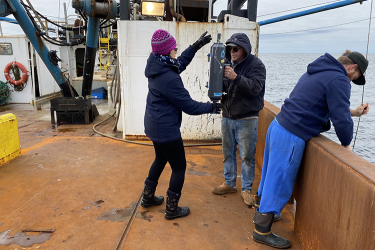My name is Brandon Raguz and I have been observing for the past year and a half. I have had the pleasure of observing bottom trawls—mainly for fluke, black sea bass, squid and bait skate—gillnet, and clam vessels in the Northeast Fisheries Observer Program.
I graduated in May of 2018 from Kutztown University of Pennsylvania with a bachelor's degree in marine science/biology. I mainly deploy out of New Jersey ports, but don’t mind the occasional travel to Long Island, New York, or Virginia ports.
I’ve come to enjoy deploying with the gillnet fleet out of Barnegat Light, New Jersey. That’s partly because I enjoy working with the fishermen there and partly because the late night/early morning drive down from Point Pleasant is actually enjoyable. The roads of Long Beach Island are empty to just cruise on. Seeing a normally active beach town so quiet really makes the early mornings and lack of sleep worth it.
Each day is different when you work at the mercy of the sea. When sampling a bottom-trawl haul, I try to get my subsamples and weights without getting in the crew’s way. It can get hectic and cluttered on deck fast. When sampling a gillnet trip, I find myself generally counting the fish as they come aboard and taking weights and length samples intermittently during each haul. But sometimes I find myself helping out by shaking the net to get all the bunker, or menhaden, out and having good conversations with the crew.
One of the best things about the job is just the change of pace from day to day. Some trips are really relaxed and almost feel like a day enjoying the ocean, other days are high paced and filled with interesting species and finds. One of the coolest fish I’ve seen was an albino roughtail stingray at the bottom of a pile of fluke. Both myself and the crew were amazed by it and a little freaked out because clearly it was never something we’d seen before.
On longer trips—anywhere from 5 to 8 days—the days tend to melt together, but reading and watching Netflix helps to move time along.* Of the countless books I’ve read, “ The Long Earth” series has helped pass the most time for me. As for TV shows I’ve watched, I keep watching “The Office". There's enough episodes in the nine seasons that it's entertaining to watch through again and pick out different episodes at random to watch and pass the time.
One thing about observing that I personally love is meeting and getting to know all the fishermen. It’s allowed me to get a good look into the industry and see how hardworking and honest they are. While I love what I do, my next step is to pursue a career in fish and wildlife law enforcement. As a young kid I always wanted to be a police officer, but through school and spending time with my dad hiking and fishing I found a love for the outdoors. I want to combine those two interests into a lifelong career.
*Fishing, like other jobs and careers, can have periods of downtime. Observers often fill it with data responsibilities, talking and connecting with the captain and crew, or other observer-related activities. But sometimes, to break things up, observers will read or watch media while gear is fishing, the vessel steams between fishing spots, or the vessel and gear undergo maintenance.
The COVID-19 emergency resulted in disruptions in NOAA Fisheries’ observer programs, but we remain able to place observers throughout the country. While it did take Northeast observers off the water, that should change in July.



